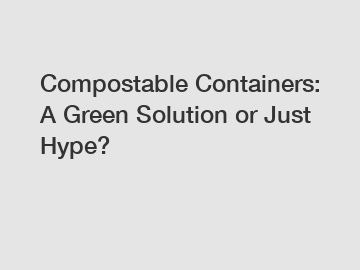Compostable Containers: A Green Solution or Just Hype?
Google Hot Topics: Compostable Containers: A Green Solution or Just Hype?
As the world becomes more environmentally conscious, the demand for sustainable products is increasing rapidly. Compostable containers have emerged as a seemingly eco-friendly solution to the mounting plastic waste problem. However, questions linger about their effectiveness and true environmental impact. Are compostable containers a green solution, or are they just another marketing hype? Let us explore this topic further.
1. Understanding the concept:

Compostable containers are made from organic materials, such as plant fibers or starches, that break down naturally when exposed to moisture and heat. Unlike traditional plastic containers, compostable ones do not contribute to the persistent plastic pollution plaguing our landfills and oceans. These containers are designed to decompose into nutrient-rich compost, adding value to the soil.
2. Benefits of compostable containers:
a. Reduced waste: By opting for compostable containers, we reduce the amount of plastic waste generated. These containers break down quickly, leaving behind minimal environmental impact.
b. Resource conservation: Production of compostable containers typically requires fewer natural resources compared to traditional plastic containers. This sustainable approach decreases reliance on fossil fuels and lowers carbon emissions.
c. Improved soil quality: Composting breaks down the organic materials within compostable containers, leading to the creation of nutrient-rich soil. This enhances agricultural productivity, reduces the need for chemical fertilizers, and increases water retention.
3. Challenges and limitations:
a. Limited infrastructure: While compostable containers offer immense potential, the infrastructure for proper composting and recycling is often lacking. Without appropriate facilities, these containers may end up in landfills, where they decompose at a slower rate, releasing methane, a potent greenhouse gas.
b. Contamination concerns: Compostable containers require specific conditions to break down completely. If mistakenly mixed with conventional plastics, they can contaminate the recycling stream and hinder the recycling process.
c. Misleading labeling: Due to the lack of strict regulations, some products labeled as "compostable" may not fully degrade within a reasonable time frame. Consumers must remain vigilant and choose products certified by trusted organizations.
4. The importance of consumer education:
a. Proper disposal practices: It is vital to educate consumers about the correct disposal methods for compostable containers. Clear labeling and widespread knowledge can help prevent contamination and ensure these containers reach appropriate composting facilities.
b. Purchasing decisions: Consumers can drive the demand for truly sustainable packaging by making informed choices. Supporting brands that prioritize compostable options will encourage a shift towards greener alternatives.
Conclusion:
Compostable containers have the potential to be a green solution to our plastic waste crisis. With their reduced environmental impact, resource conservation, and positive effects on soil quality, they offer numerous benefits over traditional plastic containers. However, challenges such as limited infrastructure and misleading labeling must be addressed to ensure their full potential is realized. By promoting consumer education and supporting brands committed to sustainability, we can separate the hype from the reality and contribute to a greener future.
Want more information on what is pbat, biodegradable resin manufacturers, biodegradable starch resin? Feel free to contact us.


